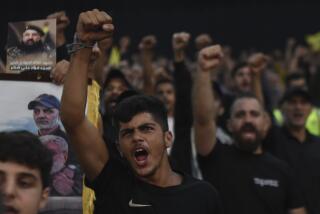Jordan’s fellow Arab states react in anger to killing of pilot
- Share via
Reporting from Cairo — A Jordanian pilot’s brutal immolation at the hands of the militants of Islamic State drew condemnation from across the Arab world, but the grim outcome of his capture was already testing the will of regional allies taking part in the U.S.-led air war in Iraq and Syria.
The burning alive of Lt. Moaz Kasasbeh, whose plane went down Dec. 24 near Raqqa, Syria -- the self-declared capital of the Islamic State’s “caliphate” -- was denounced by Jordan’s neighbors as barbaric and un-Islamic. Virtually all of them offered expressions of sympathy and solidarity to the pilot’s family and the Hashemite kingdom.
But the horrifying online footage of Kasasbeh trapped in a cage and enveloped in flames – an execution that took place a month ago, according to Jordan, but was only disclosed Tuesday -- represents a complicated new juncture in the military campaign against Islamic State, in which the participation of Arab allies is regarded as a crucial element.
Five Arab countries – Jordan, the United Arab Emirates, Bahrain, Qatar and Saudi Arabia – have taken a publicly acknowledged part in the air campaign targeting militants’ positions in Iraq and Syria. But the UAE, which had originally touted its role, suspended its bombing runs after Kasasbeh’s capture, citing an insufficiency of search-and-rescue infrastructure to save any downed pilots, according to a report in Wednesday’s editions of the New York Times.
Other regional powers, including Egypt, have endorsed the fight against Islamic State but have not taken part in the military campaign, and showed no inclination to join in. Egyptian President Abdel Fattah Sisi, who has likened the struggle to his own battle with homegrown Islamic militants, called Islamic State a “savage, cowardly organization that violates all the doctrines of heaven,” state media reported.
Saudi Arabia, still weathering a power transition following last month’s death of King Abdullah, called for a stepping up of the fight against “terror in all its forms,” according to the official news agency, which cited an unnamed Saudi official. Referring to Islamic State’s fanaticism, the statement reaffirmed Saudi “determination to continue fighting against this deluded thought.”
The UAE’s foreign minister declared “this heinous crime and obscene act” to be an “outrageous escalation from a terrorist group whose real goals and aims have now been exposed.”
Jordan has so far reacted with defiance and vows of retribution, with the first tangible sign of that the execution at dawn of two convicted Al Qaeda figures, including a female would-be suicide bomber who took part in a bloody 2005 attack on Amman hotels. Some observers predicted that the shock and fury over the young pilot’s fate would bring a show of national unity, at least for now.
“Now the Jordanian masses are angry and hitting out at [Islamic State] and not the Jordanian government or the Jordanian regime,” Khaled Zubeidi, the editor-in-chief of Jordan’s Al Destour newspaper, in an interview on Jordanian television. “There is a strong public determination … to fight the Islamic State.”
Qatar, which has played a supporting role in the air war -- primarily through hosting the U.S. Central Command’s forward headquarters at a huge base outside Doha -- offered condolences to Jordan. And tiny Bahrain, base to the U.S. Navy’s 5th Fleet, denounced what it called the “despicable crime” of Kasasbeh’s execution.
Despite the expressions of unity and determination, the Islamic State might have managed to create a stir of unease within the coalition through a statement made under apparent duress by the doomed pilot. In it, Kasasbeh described the role and weaponry employed by particular countries – most notably a claim that U.S. planes were being launched from Turkish air bases.
Turkey has denied involvement in the military campaign, though leaving room for emergency use of one of its bases. The Turkish government denounced the pilot’s killing as contrary to “humanitarian values.”
In several Arab countries, prominent clerics condemned the execution of Kasasbeh, whom friends and family described as a devout Muslim, on explicitly religious grounds. As it assembled the anti-Islamic State coalition, the U.S. administration stressed the need for religious institutions in allied states to counter the militants’ ideology and emphasize its disconnect with Islamic teachings.
In Egypt, Ahmed El-Tayeb, the head of Sunni Islam’s highest seat of learning, Al Azhar, called Islamic State “diabolical” and said that the Koran mandated a similar death for the executioners, such as crucifixion or having their arms and legs amputated.
Many Muslim public figures expressed revulsion over what they called the group’s extreme distortion of Islamic values.
“They defamed Islam, burned humanity,” Israeli Arab parliamentarian Ahmed Tibi said in a tweet. “I don’t burn people or behead them. My religion is the religion of right and justice.”
Other commentators pointed to an eerily circular element of the pilot’s gruesome fate. Islamic State is an outgrowth of a faction led by Abu Musab Zarqawi, the nom de guerre of a leading Al Qaeda commander from Jordan who was killed by U.S. forces in Iraq in 2006.
“The execution … has a tragic symbolic significance,” Iraqi-born history professor Ibrahim Marashi wrote in a commentary for Al Jazeera English. “The irony of the Jordanian pilot’s execution is that he ultimately succumbed to the violent legacy established by another Jordanian.”
That connection was underscored in Kasasbeh’s description in his execution video of the air base from which he launched his final mission. It was, he said, outside the Jordanian town of Zarqa. That was Zarqawi’s hometown.
Special correspondents Tarek Sharif in Cairo and Amro Hassan in Berlin contributed to this report.
Follow @laurakingLAT on Twitter for news out of the Middle East
More to Read
Sign up for Essential California
The most important California stories and recommendations in your inbox every morning.
You may occasionally receive promotional content from the Los Angeles Times.












